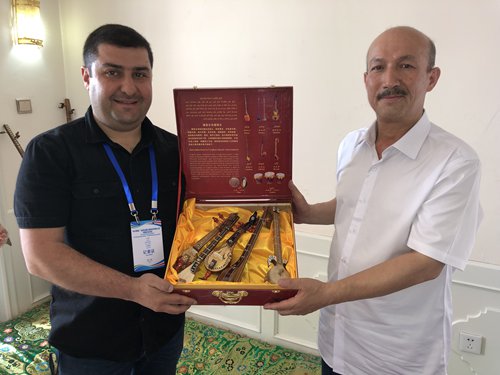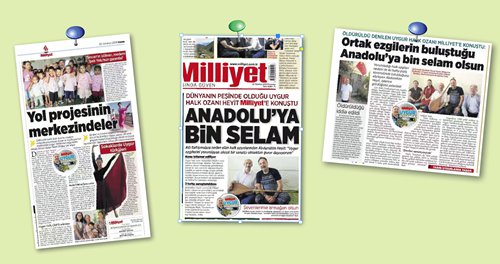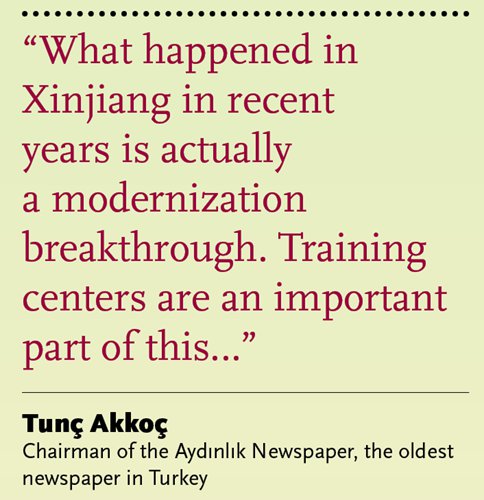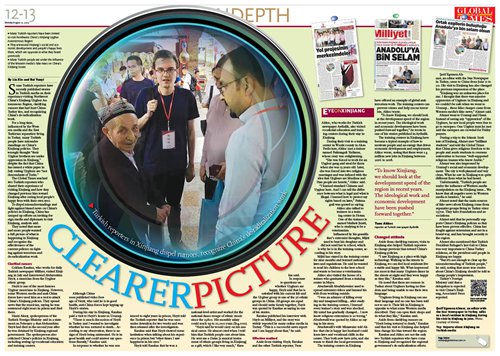HOME >> CHINA
Turkish reporters recognize Xinjiang’s de-radicalization
By Liu Xin and Bai Yunyi Source:Global Times Published: 2019/8/11 22:49:02
○ Many Turkish reporters have been invited to visit Northwest China's Xinjiang Uyghur Autonomous Region
○ They witnessed Xinjiang's social and economic development and people's happy lives there, which are opposite to what they heard previously
○ Many Turkish people are under the influence of the Western media's biased news on China's Xinjiang issues

For a long time, influenced by the Western media and the East Turkistan separatists living in Turkey, many Turkish people have misunderstandings on China's Xinjiang policies. They wrongly thought "their Uyghur brothers are under oppression in Xinjiang," despite the fact that China has issued a white paper in July stating Uyghurs are "not descendants of Turks."
The Global Times reached three Turkish reporters who shared their experience of visiting Xinjiang and how they changed their previous bias toward Xinjiang after seeing local people's happy lives with their own eyes.
To dispel misunderstandings and fight against biased news on China's policies in Xinjiang, China has ramped up efforts on inviting foreign media and diplomats to visit Xinjiang, analysts said.
They noted that more and more people wanted a full picture of what is happening in Xinjiang and recognize the effectiveness of the current policies on fighting against terrorism and de-radicalization work.
Clarified rumors
Gokhan Karakas, who works for daily Turkish newspaper Milliyet, visited Xinjiang in July and interviewed Abdurrehim Heyit, a musician from the Uyghur ethnic group.
Heyit is one of the most famous Uyghur musicians in Xinjiang. However, some Western media and anti-China forces have used him as a tool to attack China's Xinjiang policies. They spread news that the musician, saying he was sentenced to eight years in prison and died there.
Hami Aksoy, spokesperson of the Turkish Foreign Ministry said in a statement on February 9 that Abdurrehim Heyit had died in the second year after he was detained by Xinjiang regional government. The spokesperson also criticized China's policies in Xinjiang, including setting up vocational education and training centers.
Although China soon published video footage of Heyit, who said he is in good health, anti-China forces kept hyping up Heyit's stories.
During his stay in Xinjiang, Karakas paid a visit to Heyit's house in Urumqi.

In response to whether he was sentenced to eight years in prison, Heyit told the Turkish reporter that he was once under detention for two weeks and was then released after the investigation.
Karakas said that Heyit showed some hesitation when talking about his experience in prison but "other times I saw happiness in his eyes."
Heyit told Karakas that he was a national-level artist and worked for the national dance troupe of ethnic music since the 1980s. His monthly salary could reach up to 10,000 yuan ($1,400).
"Heyit said he would carry on his musical career. He almost cried when I told him that Turkish people care about him. He sent me a Dutar [a musical instrument of ethnic groups living in Xinjiang] as a gift, which I like very much," Karakas said.
In response to questions on whether Uyghurs are happy, Heyit said that he is satisfied with his current life and the Uyghur group is one of the 56 ethnic groups in China. All groups are equal and should unite firmly together, Heyit was quoted by Karakas as saying in one of his stories.
Karakas published his interview with Heyit on Milliyet, and the story was widely reposted by many online media in Turkey. "This is a successful news report and I am happy about that," he said.
Effective method
Aside from visiting Heyit, Karakas and the other Turkish reporter, Tunc Akkoç, Chairman of the Aydınlık Newspaper, the oldest newspaper in Turkey, also visited vocational education and training centers during their stay in Xinjiang.
"We visited the training centers freely," Akkoç told the Global Times. "There was no limitation, supervision or any intervention from the officials. I randomly entered all the rooms, went down to each corridor in the buildings, went to every student I wanted to chat with and asked questions to anyone I wanted. I had the chance to have a one-to-one conversation with nearly 50 students."
During their visit to a training center in Wushi county in Aksu Prefecture, Akkoç met a trainee named Patimaguli Yisilamu, whose story was enlightening.
"She was forced to work for an Uyghur gang and steal for them when she was 13 years old. Later, she was forced into two religious marriages and was infused with the idea that Uyghurs are Muslims and Han people are heretic," Akkoç said.

Akkoç said that the trainees talked to him sincerely and no one seemed under any pressure. "Because I looked into the eyes of young people and talked to them together with other reporters. If they are telling lies, we would have known it," he said.
Akkoç also visited the house of a trainee who graduated from a training center in Moyu.
Abuduwaili Abuduhewaier used to spread extremist videos and banned his wife from working outside.
"I was an admirer of killing every day and imagined killing... after studying in the training centers, I learned every trainee's story and was shocked. My mind has gradually changed... I now know religious extremism is so wrong," Abuduwaili was quoted by Akkoç as saying in his story.
Abuduwaili's wife Minawaier told Akkoç that she is happy her husband could learn laws and vocational skills in the center. They both now have jobs, and she wants to thank the local government.
Akkoç said that he learned that before being enrolled in the training centers, young people used to beat their wives, prevented women from working, refused to send their daughter to school and spread hatred among different ethnic groups.
The centers offered hope for these trainees, he believed. "They want to use the vocational skills learned from the training centers to make a living," Akkoç said.

"What happened in Xinjiang in recent years is actually a modernization breakthrough," Akkoç said. "Training centers are an important part of this… The regional government seeks ways to remove the root of extremism.
"It's not only about getting rid of flies, but also about drying the swamp."
Akkoç said China set an example to the world in fighting terrorism and extremism.
The training centers in Xinjiang have become a typical example of how to motivate people and an energy that drives economic development and employment, Akkoç wrote in his stories, noting that there were 1.4 million new jobs in Xinjiang between 2016 to 2018.
Changed attitude
Aside from clarifying rumors, visits to Xinjiang also helped Turkish reporters to change previous bias toward China's Xinjiang policies.
"I saw Xinjiang as a place with high technology. Walking in the streets in Xinjiang, we can feel local residents live a stable and happy life. What impressed me most is that many Uyghurs dance in the streets at night and they were happy as they like," Karakas said.
He noted that there are rumors in Turkey about Uyghurs having no freedom and being unable to use their own language.
"Uyghurs living in Xinjiang can use their language and no one has been told not to use it. Their life in Xinjiang is opposite to what some Western media described. They can open their shops and do what they like," Karakas said.
Aside from clarifying rumors on "Heyit being tortured to death," Karakas said that his visit to Xinjiang also helped him change his bias toward the region.
Karakas and Akkoç are not the only two Turkish reporters who have come to Xinjiang and recognized the regional government's de-radicalization efforts.
Şerif Egemen Ahmet, an editor with the Star Newspaper in Turkey, came to China from June 11 to 20. His visit to Xinjiang has also changed his previous impression of the place.
"Xinjiang was an unknown place for me. I thought that there was massive oppression of Uyghurs in Xinjiang and we couldn't be safe when we went to Urumqi... these false charges came from Western media's fake news," Ahmet said.
Ahmet went to Urumqi and Hami. Instead of seeing any "oppression" of the Uyghurs, he saw local people were free to go to mosques. One Uyghur man he met said the mosques are crowded for Friday prayers.
During a trip to the Islamic Institute of Xinjiang, Ahmet met "brilliant students" and told the Global Times that China gives religious freedom to its people and sends students to overseas universities to become "well-supported religious imams who know Arabic."
Ahmet was also impressed by Urumqi's social and economic development. The city is well-planned and very clean. What he saw in Xinjiang was quite different from what he had heard.
Akkoç was also optimistic about Xinjiang's future development - more investment coming to Xinjiang and the per capita income increasing.
"China can change this situation by strengthening cooperation with international media outlets. Western hegemony in the field of media can thus be overcome."
Unfortunately, "Turkish people are under the influence of Western media manipulation on the Xinjiang issue... We know that all negative news in Western media is baseless," Ahmet said.
Ahmet noted that the main sources of fake news about Xinjiang come from separatist groups living in Turkey since 1970s. They have foundations and associations.
Ahmet also mentioned that Turkish President Erdogan's last visit to China was very important to China-Turkey relations, as the president said people in Xinjiang are happy.
"But it's not enough to clear up the misunderstanding of Turkish people," he said, noting that more true stories about China's Xinjiang should be told to change people's impression.
Akkoç said that Turkey and the international community do not have enough information about the historical development of China.
Xinjiang is in a strategic position for the Belt and Road Initiative, which will bring peace to the world, Akkoç said.
True stories about Xinjiang should be told in Turkey as it would benefit the China-Turkey ties, he believed.
Turkey's Foreign Ministry said that a delegation is expected to visit China's Xinjiang, Associated Press reported.

Newspaper headline: Clearer picture
○ They witnessed Xinjiang's social and economic development and people's happy lives there, which are opposite to what they heard previously
○ Many Turkish people are under the influence of the Western media's biased news on China's Xinjiang issues

Serif Egemen Ahmet, an editor with the Star Newspaper in Turkey, talks to a local resident in Xinjiang during his visit in Xinjiang in June. Photo: Courtesy of Ahmet
Some Turkish reporters have recently published stories in Turkish media on their experience visiting Northwest China's Xinjiang Uyghur Autonomous Region, clarifying rumors that had hurt China-Turkey ties, and recognizing China's de-radicalization work.For a long time, influenced by the Western media and the East Turkistan separatists living in Turkey, many Turkish people have misunderstandings on China's Xinjiang policies. They wrongly thought "their Uyghur brothers are under oppression in Xinjiang," despite the fact that China has issued a white paper in July stating Uyghurs are "not descendants of Turks."
The Global Times reached three Turkish reporters who shared their experience of visiting Xinjiang and how they changed their previous bias toward Xinjiang after seeing local people's happy lives with their own eyes.
To dispel misunderstandings and fight against biased news on China's policies in Xinjiang, China has ramped up efforts on inviting foreign media and diplomats to visit Xinjiang, analysts said.
They noted that more and more people wanted a full picture of what is happening in Xinjiang and recognize the effectiveness of the current policies on fighting against terrorism and de-radicalization work.
Clarified rumors
Gokhan Karakas, who works for daily Turkish newspaper Milliyet, visited Xinjiang in July and interviewed Abdurrehim Heyit, a musician from the Uyghur ethnic group.
Heyit is one of the most famous Uyghur musicians in Xinjiang. However, some Western media and anti-China forces have used him as a tool to attack China's Xinjiang policies. They spread news that the musician, saying he was sentenced to eight years in prison and died there.
Hami Aksoy, spokesperson of the Turkish Foreign Ministry said in a statement on February 9 that Abdurrehim Heyit had died in the second year after he was detained by Xinjiang regional government. The spokesperson also criticized China's policies in Xinjiang, including setting up vocational education and training centers.
Although China soon published video footage of Heyit, who said he is in good health, anti-China forces kept hyping up Heyit's stories.
During his stay in Xinjiang, Karakas paid a visit to Heyit's house in Urumqi.

Tunç Akkoç,Chairman of the Aydinlik Newspaper, meets with Abdurrehim Heyit, a Uyghur musician in Urumqi in June. Photo: Courtesy of Akkoc
"There is much discussion of Heyit in Turkey and I wanted to investigate whether he was tortured to death... According to my observation, there is no sign of Heyit being mistreated. He is in good health and could answer my questions fluently," Karakas said.In response to whether he was sentenced to eight years in prison, Heyit told the Turkish reporter that he was once under detention for two weeks and was then released after the investigation.
Karakas said that Heyit showed some hesitation when talking about his experience in prison but "other times I saw happiness in his eyes."
Heyit told Karakas that he was a national-level artist and worked for the national dance troupe of ethnic music since the 1980s. His monthly salary could reach up to 10,000 yuan ($1,400).
"Heyit said he would carry on his musical career. He almost cried when I told him that Turkish people care about him. He sent me a Dutar [a musical instrument of ethnic groups living in Xinjiang] as a gift, which I like very much," Karakas said.
In response to questions on whether Uyghurs are happy, Heyit said that he is satisfied with his current life and the Uyghur group is one of the 56 ethnic groups in China. All groups are equal and should unite firmly together, Heyit was quoted by Karakas as saying in one of his stories.
Karakas published his interview with Heyit on Milliyet, and the story was widely reposted by many online media in Turkey. "This is a successful news report and I am happy about that," he said.
Effective method
Aside from visiting Heyit, Karakas and the other Turkish reporter, Tunc Akkoç, Chairman of the Aydınlık Newspaper, the oldest newspaper in Turkey, also visited vocational education and training centers during their stay in Xinjiang.
"We visited the training centers freely," Akkoç told the Global Times. "There was no limitation, supervision or any intervention from the officials. I randomly entered all the rooms, went down to each corridor in the buildings, went to every student I wanted to chat with and asked questions to anyone I wanted. I had the chance to have a one-to-one conversation with nearly 50 students."
During their visit to a training center in Wushi county in Aksu Prefecture, Akkoç met a trainee named Patimaguli Yisilamu, whose story was enlightening.
"She was forced to work for an Uyghur gang and steal for them when she was 13 years old. Later, she was forced into two religious marriages and was infused with the idea that Uyghurs are Muslims and Han people are heretic," Akkoç said.

Reports about Xinjiang on Turkish media
"I learned standard Chinese and Uyghur here. And I can tell the difference between what is legal and what is illegal. I learned how to protect my rights based on laws," Patimaguli was quoted as saying.Akkoç said that the trainees talked to him sincerely and no one seemed under any pressure. "Because I looked into the eyes of young people and talked to them together with other reporters. If they are telling lies, we would have known it," he said.
Akkoç also visited the house of a trainee who graduated from a training center in Moyu.
Abuduwaili Abuduhewaier used to spread extremist videos and banned his wife from working outside.
"I was an admirer of killing every day and imagined killing... after studying in the training centers, I learned every trainee's story and was shocked. My mind has gradually changed... I now know religious extremism is so wrong," Abuduwaili was quoted by Akkoç as saying in his story.
Abuduwaili's wife Minawaier told Akkoç that she is happy her husband could learn laws and vocational skills in the center. They both now have jobs, and she wants to thank the local government.
Akkoç said that he learned that before being enrolled in the training centers, young people used to beat their wives, prevented women from working, refused to send their daughter to school and spread hatred among different ethnic groups.
The centers offered hope for these trainees, he believed. "They want to use the vocational skills learned from the training centers to make a living," Akkoç said.

He described the trainees about to graduate as modern people closely connected to their country and laws, respectful of other ethnic groups and with the skills to make a living.
"What happened in Xinjiang in recent years is actually a modernization breakthrough," Akkoç said. "Training centers are an important part of this… The regional government seeks ways to remove the root of extremism.
"It's not only about getting rid of flies, but also about drying the swamp."
Akkoç said China set an example to the world in fighting terrorism and extremism.
The training centers in Xinjiang have become a typical example of how to motivate people and an energy that drives economic development and employment, Akkoç wrote in his stories, noting that there were 1.4 million new jobs in Xinjiang between 2016 to 2018.
Changed attitude
Aside from clarifying rumors, visits to Xinjiang also helped Turkish reporters to change previous bias toward China's Xinjiang policies.
"I saw Xinjiang as a place with high technology. Walking in the streets in Xinjiang, we can feel local residents live a stable and happy life. What impressed me most is that many Uyghurs dance in the streets at night and they were happy as they like," Karakas said.
He noted that there are rumors in Turkey about Uyghurs having no freedom and being unable to use their own language.
"Uyghurs living in Xinjiang can use their language and no one has been told not to use it. Their life in Xinjiang is opposite to what some Western media described. They can open their shops and do what they like," Karakas said.
Aside from clarifying rumors on "Heyit being tortured to death," Karakas said that his visit to Xinjiang also helped him change his bias toward the region.
Karakas and Akkoç are not the only two Turkish reporters who have come to Xinjiang and recognized the regional government's de-radicalization efforts.
Şerif Egemen Ahmet, an editor with the Star Newspaper in Turkey, came to China from June 11 to 20. His visit to Xinjiang has also changed his previous impression of the place.
"Xinjiang was an unknown place for me. I thought that there was massive oppression of Uyghurs in Xinjiang and we couldn't be safe when we went to Urumqi... these false charges came from Western media's fake news," Ahmet said.
Ahmet went to Urumqi and Hami. Instead of seeing any "oppression" of the Uyghurs, he saw local people were free to go to mosques. One Uyghur man he met said the mosques are crowded for Friday prayers.
During a trip to the Islamic Institute of Xinjiang, Ahmet met "brilliant students" and told the Global Times that China gives religious freedom to its people and sends students to overseas universities to become "well-supported religious imams who know Arabic."
Ahmet was also impressed by Urumqi's social and economic development. The city is well-planned and very clean. What he saw in Xinjiang was quite different from what he had heard.
Akkoç was also optimistic about Xinjiang's future development - more investment coming to Xinjiang and the per capita income increasing.
"China can change this situation by strengthening cooperation with international media outlets. Western hegemony in the field of media can thus be overcome."
Unfortunately, "Turkish people are under the influence of Western media manipulation on the Xinjiang issue... We know that all negative news in Western media is baseless," Ahmet said.
Ahmet noted that the main sources of fake news about Xinjiang come from separatist groups living in Turkey since 1970s. They have foundations and associations.
Ahmet also mentioned that Turkish President Erdogan's last visit to China was very important to China-Turkey relations, as the president said people in Xinjiang are happy.
"But it's not enough to clear up the misunderstanding of Turkish people," he said, noting that more true stories about China's Xinjiang should be told to change people's impression.
Akkoç said that Turkey and the international community do not have enough information about the historical development of China.
Xinjiang is in a strategic position for the Belt and Road Initiative, which will bring peace to the world, Akkoç said.
True stories about Xinjiang should be told in Turkey as it would benefit the China-Turkey ties, he believed.
Turkey's Foreign Ministry said that a delegation is expected to visit China's Xinjiang, Associated Press reported.

Newspaper headline: Clearer picture